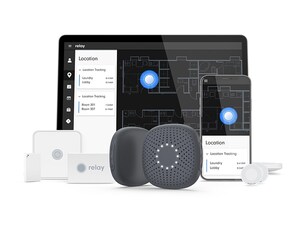The frontline communications innovator Relay found that prevailing approaches see bilingual employees serve as ad-hoc interpreters, compromising their own productivity and leading to widespread labor underutilization
RALEIGH, N.C., Jan. 8, 2025 /PRNewswire/ -- Relay, the cloud-based communications platform designed to improve productivity and safety for frontline teams, today announced the findings of a new research study detailing the hidden costs of language barriers in the industrial sector.
Rather than look at the significant but readily quantified costs associated with managing multilingual teams — such as language courses, third-party translation services, and the like — this study aims to uncover the hidden, largely overlooked costs that emerge when frontline teams attempt to navigate language barriers without adequate tools, resources, or planning.
To access these insights, Relay surveyed 200 frontline professionals working on multilingual teams from across the industrial sector. Chief among the study's findings is the revelation that, on average, businesses in the industrial sector lose $486,078 per year in largely unseen labor costs. Most of these losses result from simple human resource underutilization and inefficiencies caused by poorly-constructed, ad-hoc approaches to on-the-job translation.
Relay's researchers concluded that language barriers regularly carry hidden labor costs as a result of bilingual employees being repeatedly pulled away from their primary roles and responsibilities in order to translate to or for their limited English proficient (LEP) coworkers. As a result, their employers unwittingly incur continuous, incremental losses from underutilized labor, reduced output, and decreased efficiency.
Language Barriers by the Numbers: Prevalence, Cost & Other Considerations
According to the 2023 U.S. Census, nearly 30 million people in the U.S. identified as LEP, making up roughly 9% of the entire population. As this community continues to grow, the trends identified in the present study are all but certain to not only persist, but accelerate. Forward-looking business leaders would be wise to take heed of these trends and findings sooner than later in order to address how the evolving demographic makeup of the American workforce continues to change the way businesses operate.
Additional Key Findings:
- The average bilingual frontline worker spends 4 hours per week assisting other workers with translation.
- This equates to approximately $7,500 in misallocated labor costs per bilingual employee per year.
- Among limited English proficiency (LEP) workers who require regular translation support, they spend, on average, 6.5 hours per week communicating via some form of translator or device.
- This equates to over $4,900 in lost labor costs per employee per year for those that require regular support.
- The overwhelming majority of frontline workers (83%) said they would like to see their worksite increase investment in technology-driven translation solutions to reduce language barriers.
Beyond the Numbers — Other Ways Language Barriers Impact the Workplace
From reduced productivity to training troubles, language barriers can impact businesses and their workers in myriad ways — including compromising workplace safety. According to OSHA, language barriers play a role in roughly a quarter (25%) of all on-the-job accidents.
"While the financial impacts of language barriers in the industrial sector are very expensive, it's important to remember that there is even more at stake when communication breakdowns occur on the factory floor in terms of employee safety risks," said Relay CEO Chris Chuang." That's why Relay remains committed to its cause—to develop innovative, accessible technologies that make work safer, simpler, and more productive for the two-and-a-half-billion-plus frontline workers of the world."
Break Down Language Barriers with Breakthrough Technologies from Relay
Unfortunately, the most common approach to on-the-job translation still consists of prying bilingual employees away from their actual work to serve as impromptu interpreters for their coworkers. With 77% of respondents confirming this strategy is currently being used in their own workplaces, it's clear there is considerable need across the industrial sector for smarter solutions to these costly problems.
Thankfully, companies like Relay are introducing innovative new technologies that promise to change this trend by breaking down language barriers for good. Earlier this year, Relay released TeamTranslate™—a one-of-a-kind, AI-based live voice and text translation solution that allows entire teams to converse freely, from any location, and across over 33 languages—all in real time.
Each user simply selects their preferred language and TeamTranslate does the rest— ensuring every message they send and receive is automatically translated to each individual's language of choice in real time, regardless of how many participants are involved. By allowing multilingual teams to connect, converse, and collaborate across physical and linguistic divides, TeamTranslate spares businesses and their frontline workers from the stress, costs, and inefficiencies inherent to language barriers.
About the Study
Commissioned by Relay and conducted in partnership with an independent market research recruiting company, the original survey polled 200 manufacturing and warehousing professionals working on the factory floor or within the plant itself (i.e. excluding office workers). Survey respondents work for companies with 50+ employees across all shifts, have ESL workers that need translation assistance to communicate, and have one or more non-English languages spoken at the plant.
About Relay
Relay is a cloud-based technology platform that helps frontline teams improve communications, increase employee safety, and improve their productivity. Relay enables digital transformation on the front lines, by supplying workers with the modern tools and real-time, actionable data they need to track performance and improve operations. Software has not yet transformed the frontline world, and Relay is on a mission to change that. For more information, visit www.relaypro.com.
Media Contact:
[email protected]
SOURCE Relay Inc.

WANT YOUR COMPANY'S NEWS FEATURED ON PRNEWSWIRE.COM?
Newsrooms &
Influencers
Digital Media
Outlets
Journalists
Opted In





Share this article